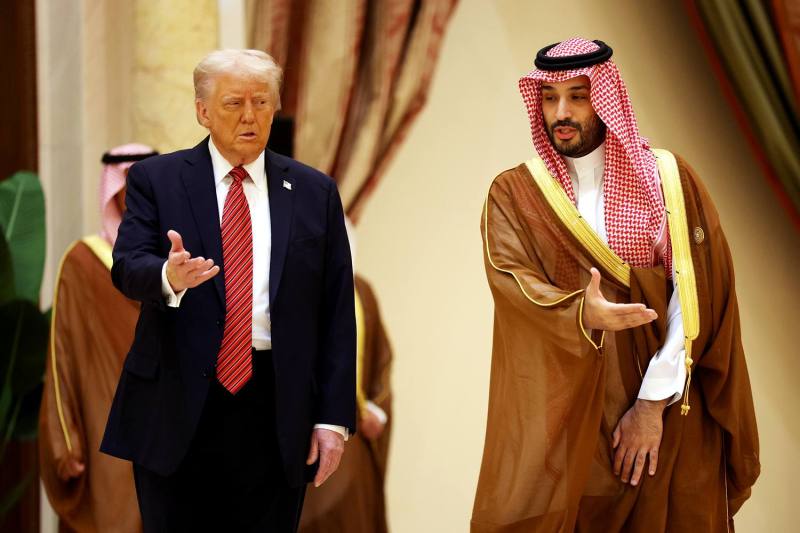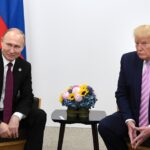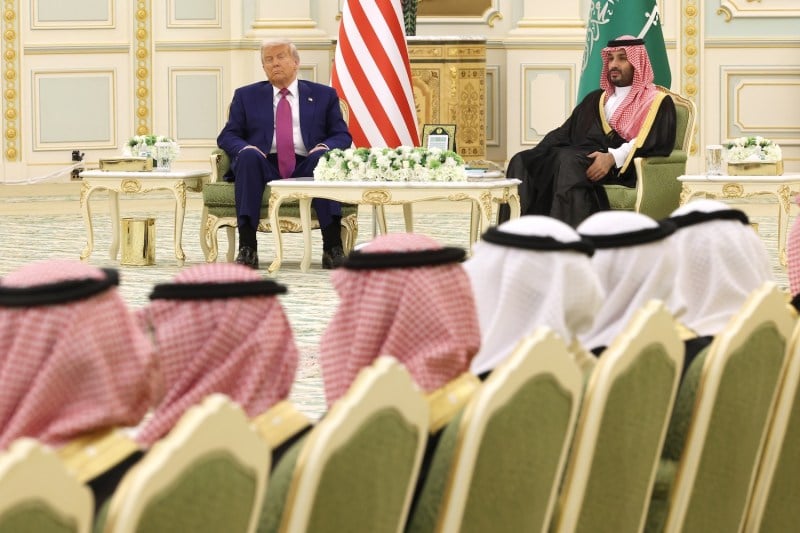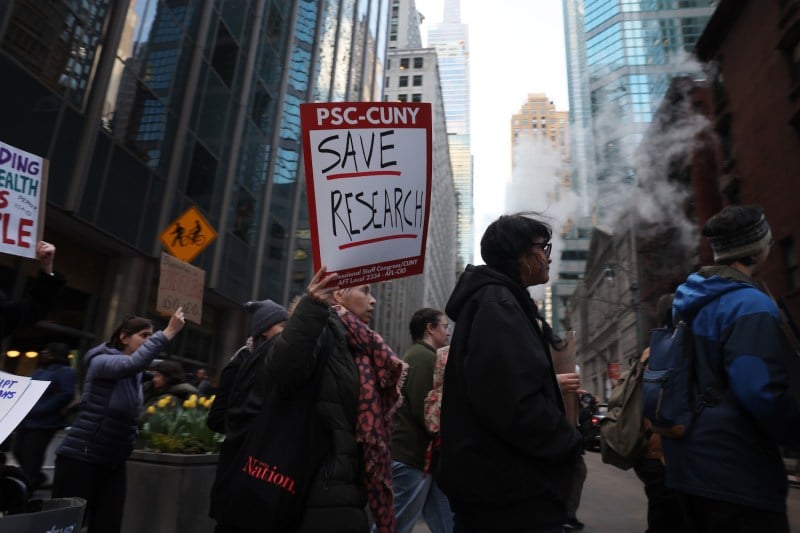Trump’s Gulf Dealmaking Bonanza

Trump’s Gulf Dealmaking Bonanza
Saudi Arabia and Qatar made splashy economic commitments worth nearly $2 trillion during the U.S. president’s visit.
U.S. President Donald Trump and Saudi Crown Prince Mohammed bin Salman speak as they arrive during the Gulf Cooperation Council leaders’ summit at the Ritz-Carlton in Riyadh, Saudi Arabia, on May 14. Win McNamee/Getty Images
Welcome back to Foreign Policy’s Situation Report, where we are in the process of booking our flights to The Hague for next month’s NATO summit. Stay tuned for special on-the ground editions of SitRep from the big event.
Here’s what’s on tap for the day: U.S. President Donald Trump gets his trillion-dollar Middle East announcements, Russian President Vladimir Putin skips an Istanbul meeting with Ukrainian President Volodymyr Zelensky, and India’s military hostilities with Pakistan reach a “pause.”
Welcome back to Foreign Policy’s Situation Report, where we are in the process of booking our flights to The Hague for next month’s NATO summit. Stay tuned for special on-the ground editions of SitRep from the big event.
Here’s what’s on tap for the day: U.S. President Donald Trump gets his trillion-dollar Middle East announcements, Russian President Vladimir Putin skips an Istanbul meeting with Ukrainian President Volodymyr Zelensky, and India’s military hostilities with Pakistan reach a “pause.”
The Deals Start Comin’ and They Don’t Stop Comin’
Trump’s visit to three of the world’s richest countries this week was all about big wins and big dollar amounts (as Rishi wrote on Monday). And boy, did those countries deliver.
Saudi Arabia and Qatar, Trump’s first two hosts of the week, announced what the White House described as “historic” economic investment and defense deals with the United States—worth almost $2 trillion combined.
Trump’s visit to the United Arab Emirates—his final stop of the trip—was still ongoing as of this writing. But the UAE government got a head start on the big numbers during the visit of its national security advisor, Sheikh Tahnoon bin Zayed Al Nahyan, to Washington in March, when it announced several deals along with a plan to invest $1.4 trillion in the United States over the next 10 years. And late Thursday, the two countries signed an agreement for a “US-UAE AI Acceleration Partnership” that includes a sprawling new AI data center in Abu Dhabi, but there was no immediate dollar amount attached.
As expected, the bulk of this week’s announcements concerned technology and defense, as the Persian Gulf countries continue to shore up their security while diversifying away from the oil revenues that earned them the bulk of their immense wealth.
Here are the main highlights:
Saudi spends. As Saudi Crown Prince and Prime Minister Mohammed bin Salman promised back in January, he and Trump announced deals worth $600 billion on Tuesday—a big number, though not quite the $1 trillion that Trump had said he was hoping for. And some signage at the Riyadh investment summit that Trump attended—along with a who’s who of U.S. executives and billionaires, including Elon Musk, Nvidia CEO Jensen Huang, and Amazon CEO Andy Jassy—touted only $300 billion worth of deals, Bloomberg reported. (Trump’s White House used the $600 billion figure in its announcement.)
The biggest line item that the White House touted was a roughly $142 billion defense sales agreement that will see Riyadh purchase equipment and services from “over a dozen U.S. defense firms” to modernize the kingdom’s military, according to the White House, including upgrades to its air force and space capabilities, missile defense systems, and military communications.
There was also a slew of tech deals to bolster Saudi Arabia’s goal of becoming a global player in artificial intelligence, with Saudi company DataVolt signing a deal worth $20 billion to build AI data centers in the United States and committing to invest another $80 billion alongside U.S. giants Google, Oracle, Salesforce, AMD, and Uber in “cutting-edge transformative technologies.”
The highest-profile tech deals were reserved for Humain, a brand-new AI company backed by the Saudi government’s roughly $940 billion sovereign wealth fund. The company, which was launched just one day before Trump’s visit, announced a partnership with U.S. AI and chip darling Nvidia to create “AI factories” in Saudi Arabia using “several hundred thousand” of the company’s coveted semiconductor chips. The company also secured a $10 billion deal with rival chipmaker AMD to jointly develop AI infrastructure.
The deals coincided with the Trump administration’s relaxing of an AI diffusion rule put forward by Trump’s immediate predecessor, President Joe Biden, making it easier for Saudi Arabia and other Gulf countries to access advanced U.S. chips.
(Qat)Art of the Deal. If you’re measuring success by sheer top-line numbers (and there are innumerable indications that Trump does exactly that), then Qatar won this trip by a long shot.
The small Gulf country, the president’s second stop after Riyadh, announced what the Trump administration described as a $1.2 trillion “economic exchange” and “commitment” between the two countries, doubling the pledge that Trump secured from the Saudis. However, it’s not immediately clear where that number came from—the fine print in the White House fact sheet pointed to deals worth $243.5 billion.
The biggest of those deals was a $96 billion order for 210 commercial jets made by U.S. company Boeing, one of the company’s largest ever orders. However, the announcement was dogged by a Boeing plane not included in that order: Qatar’s $400 million “palace in the sky,” which it has offered as a gift to Trump. The plane would be used as Air Force One for the remainder of Trump’s term; after that, it would be donated to his presidential library foundation for his continued use.
Though the details are still being worked out, Trump has expressed his desire to accept the gift, which U.S. lawmakers in both parties have said would be blatantly unconstitutional. Qatari Prime Minister Sheikh Mohammed bin Abdulrahman Al Thani disputed the characterization of the plane as a personal gift to Trump, describing it instead as a “government-to-government transaction” in an interview with CNN on Wednesday.
Qatar also agreed to purchase $1 billion worth of counter-drone systems from U.S. defense company Raytheon, as well as nearly $2 billion worth of some of the drones that those systems are supposed to be used against, from San Diego-based General Atomics. Trump and Thani also signed a “statement of intent” for a further $38 billion in possible defense sales.
It remains to be seen how much follow-through there actually will be on these deals, but Trump got the big headline numbers that he asked for—and then some.
Let’s Get Personnel
Anita Anand was named as Canada’s new foreign minister this week, replacing Melanie Joly. Anand, the daughter of Indian immigrants, is the first Hindu to hold the post. She takes on the role of Canada’s top diplomat amid a period of rocky relations between Ottawa and New Delhi.
On the Button
What should be high on your radar, if it isn’t already.
Freedom zone. Trump on Thursday once again called for the United States to take control of the Gaza Strip and turn it into a “freedom zone.”
“Gaza has been a territory of death and destruction for many years,” Trump said during his visit to Qatar. “I have concepts for Gaza that I think are very good—make it a freedom zone. Let the United States get involved and make it just a freedom zone.”
Trump’s plan for Gaza would involve displacing all of the Palestinian residents in the coastal enclave, which critics say would amount to ethnic cleansing. His proposal has received support from Israel, but Arab countries have fervently rejected it.
Putin stays home. Russian President Vladimir Putin passed on an opportunity to meet with Ukrainian President Volodymyr Zelensky for peace talks in Istanbul on Thursday, instead sending a junior delegation. It was Putin who initially proposed the talks.
Trump, who indicated that he might come to Turkey if “appropriate,” was also a no-show.
Zelensky, whom Trump had pressured to sit down with Putin, arrived in Turkey on Thursday and met with Turkish President Recep Tayyip Erdogan in Ankara.
After it was announced that Putin would not be attending the talks in Istanbul, Zelensky said that he wouldn’t attend, either, and would instead send a delegation led by his defense minister. Zelensky also ripped into Putin for staying home.
“I feel disrespect from Russia. No meeting time, no agenda, no high-level delegation—this is personal disrespect. To Erdogan, to Trump,” Zelensky said.
It’s not clear precisely when the Ukrainian and Russian delegations will meet, but if the talks happen, they’ll mark the first direct discussions between the two sides in three years.
However, U.S. Secretary of State Marco Rubio, who along with other senior U.S. officials was also in Turkey on Thursday for the hoped-for talks, said that Washington “didn’t have high expectations” for the negotiations in Istanbul. “I don’t think we’re going to have a breakthrough here until the president (Trump) and President Putin interact directly on this topic,” Rubio said.
Still, Rubio said he would travel to Istanbul to meet with Turkey’s foreign minister and the Ukrainian delegation on Friday.
A ‘sort of’ deal with Iran. Trump sounded positive on Thursday about the prospect of a nuclear deal with Iran, saying that an agreement was “very close” and that Iran had “sort of” agreed to terms put forward by Washington.
The United States and Iran have already participated in several rounds of talks mediated by Oman. Washington wants a deal that would prevent Iran from developing a nuclear weapon, and Tehran wants sanctions relief. The U.S.-Iran talks began in mid-April. If a deal is reached in the near future, it would be a remarkably quick result compared to negotiations over the 2015 nuclear deal, which lasted 20 months. Trump withdrew from the 2015 deal during his first term.
Trump has signaled that the United States could take military action against Iran if diplomacy fails, but on Thursday, he said that he hoped to avoid going that route.
Snapshot
Hundreds of friends, family, and residents gather downtown to watch the release of Edan Alexander, believed to be the last living U.S. citizen kidnapped by Hamas, seen in Tenafly, New Jersey, on May 12.Spencer Platt/Getty Images
Hot Mic
“On our side, we have no intention to initiate” further military action against Pakistan, a senior Indian official told reporters—including your SitRep author—in Washington on Wednesday. Pakistani Foreign Minister Ishaq Dar expressed a similar sentiment in a Monday interview with CNN, saying that he had promised Rubio that “if India does not restart, we would not do it.”
The two sides’ comments have raised hopes that the worst of this particular conflict might have passed.
The Indian official, described the cessation of hostilities as a “pause” rather than the “cease-fire” framing used by Trump in his Truth Social post over the weekend, in which he said the United States had mediated talks between the two countries.
India has downplayed that characterization, saying that the two countries agreed to stop firing at each other after a call from Pakistan’s military leadership to India’s. Dar, however, credited Rubio with passing on the message.
Asked where the miscommunication may have arisen from, the Indian official said that New Delhi’s only “effort was to keep partners apprised” of its actions and that conversations “happened very fast.”
Regardless of the detente, last week’s hostilities showcased a new dimension in the conflict between the two nuclear-armed neighbors with the heightened use of drones. (The Indian official also highlighted the “changing nature of warfare in the region” in their remarks.) John has a new piece out on the drones’ impact on the conflict, which you can read here.
Put on Your Radar
Monday, May 19: Leaders from the United Kingdom and European Union are set to meet in London for a summit on improving post-Brexit ties.
Tuesday, May 20: Canada is set to welcome G-7 finance ministers and central bank governors for a meeting in Banff, Alberta.
Wednesday, May 21: Trump is set to host South African President Cyril Ramaphosa at the White House.
Quote of the Week
“They better sweep that plane from front to back.”
—GOP Sen. Cynthia Lummis of Wyoming when asked about Trump’s plan to accept a $400 million plane from Qatar and use it as the new Air Force One.
This Week’s Most Read
- A Tale of Four Fighter Jets by Rishi Iyengar
- Joseph Nye Was the Champion of a World That No Longer Exists by Suzanne Nossel
- Why Khamenei Is Betting on Trump by Alex Vatanka
Whiskey Tango Foxtrot
We’ve been admiringly reading, rereading, and discussing this truly birdbrained (in the best way possible) investigation by our sister publication, Slate, into how the wrong bird made it into a pivotal scene in the 2000 remake of Charlie’s Angels starring Cameron Diaz, Lucy Liu, Drew Barrymore, and Bill Murray. No spoilers, just read it and let your imagination take flight.
Rishi Iyengar is a reporter at Foreign Policy. Bluesky: @iyengarish.bsky.social X: @Iyengarish Instagram: @iyengar.rishi
John Haltiwanger is a reporter at Foreign Policy. X: @jchaltiwanger
More from Foreign Policy
-

Indian Air Force personnel stand in front of a Rafale fighter jet during a military aviation exhibition at the Yelahanka Air Force Station in Bengaluru. A Tale of Four Fighter Jets
The aircraft India and Pakistan use to strike each other tell a story of key geopolitical shifts.
-

A cardinal in a black robe with red sash with hands folded in front of him walks past a stage and steps. Conclave Sends Message With American Pope
Some cardinals had been agitating for U.S. leadership to counter Trump.
-

An illustration shows red tape lines crossing over and entrapping a semiconductor chip. Is It Too Late to Slow China’s AI Development?
The U.S. has been trying to keep its technological lead through export restrictions, but China is closing the gap.
-

A man watches a news program about Chinese military drills surrounding Taiwan, on a giant screen outside a shopping mall in Beijing on Oct. 14, 2024. The Pentagon Fixates on War Over Taiwan
While U.S. military leaders fret about China, Trump has dismissed the Asia-Pacific.










Join the Conversation
Commenting on this and other recent articles is just one benefit of a Foreign Policy subscription.
Already a subscriber?
.
Subscribe
Subscribe
View Comments
Join the Conversation
Join the conversation on this and other recent Foreign Policy articles when you subscribe now.
Subscribe
Subscribe
Not your account?
View Comments
Join the Conversation
Please follow our comment guidelines, stay on topic, and be civil, courteous, and respectful of others’ beliefs.
Change your username |
Log out
Change your username:
CANCEL
Confirm your username to get started.
The default username below has been generated using the first name and last initial on your FP subscriber account. Usernames may be updated at any time and must not contain inappropriate or offensive language.